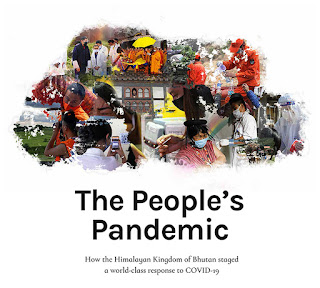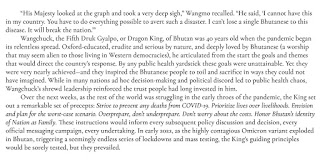The razzmatazz of the birth of a new child - that of Bhutan’s tourism - is now, hopefully, behind us. Although seemingly unconcerned, many of us private citizens have been more engaged than most of the drummers and honkers that make up the transformation brigade. All across the country - Paro, Phuentsholing, Samdrup Jongkhar, Gelephu, Samtse etc. colorful flags have been unfurled, dancing girls and hooded monks did their thing - the change makers stooped low to welcome the pleasantly surprised visitors who came with the old “Faith” in mind but hopefully will go back home with a new “Belief”.
It is now time to move on; we will need to put to rest our individual differences - the child is now out of the womb and in the open. It is now everyone’s duty to care for and nurture the infant. Whether Apsara-like or grotesque and deformed, it is our child - we will have to take charge of it until it is firmly on its feet. From here on forward, it should not be about not being our fault - but about how we might collectively contribute to correcting the course.
But for me the silver lining at the end of all the razzle-dazzle and show of brilliance and incomparability, has been the demure event that took place in Jaigaon across the border in India, on 24th September, 2022. The Indian business community across the border celebrated Bhutan’s opening of tourism - with their own brand of celebrations. This was a touching moment - a re-enforcement, if any were needed, of their trust and faith in Bhutan, their joy in our small successes, and their commitment to walk the distance with us - through thick and thin. Proof that they will forgive us our minor quirks, as we are wont to do theirs.
India has supported Bhutan in every sphere of our nation building - from our first Five Year Plan to the present. To this day they remain firmly behind us, pandering to our every whim and fancy. The friendship and generosity the Indian people offer us is unparalleled.
At the end - we matter to them because they matter to us. There is mutual benefit to harmonious coexistence. In their progress is our progress - we succeed because they do. This has been the guiding principal on which is founded our close to three-fourth century of nurturing each other - we will continue to do so for many eons to come. After all, we are common in our shared culture and religion.
One thing is a matter of great regret - Bhutan could never draw in the Indian tourists of standing. The Indian middle class is hundred times richer than any chilips. The Indians have billions in black money that they do not know where to spend. The policy hawks will do well to divert their attention from chilips to attract the rich Indians who number in the hundreds of millions. Economically, it makes sense to target the closest markets - India and China - to give us the numbers that we seek, despite our smarting.
In this direction, the TCB has failed miserably. The tour operators too failed to grasp the potential that exists in the vast Indian market - our most favored nation and supporter.










